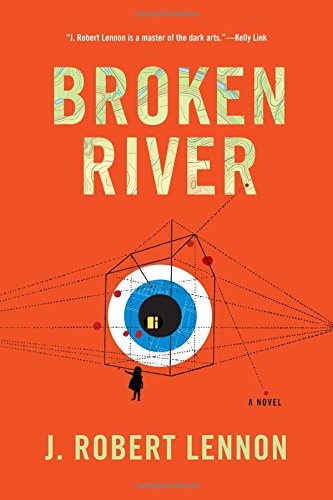Broken River
by J. Robert Lennon
reviewed by Kevin Zambrano
Broken River, the eighth novel by J. Robert Lennon, signals its intentions in its title. After a bizarre, memorable first chapter, the book effectively splits in two, into a realistic thriller and an experimental metafiction. Lennon has often written about writing in his earlier work, and in the first chapter of Broken River, he crafts a new vehicle for metafiction: a hypothetical consciousness, “a presence without corporeal substance,” that floats in the kitchen of a house whose owners are being raped and murdered in the driveway. At the end of the chapter, after this hypothetical observer spends years watching the house through dereliction and restoration, “our observer” becomes a character, “the Observer.” Here, Broken River reaches its narrative juncture.
Down the first path is an entertaining domestic thriller, in which a dysfunctional Brooklyn family moves to the scene of the murders, a house in upstate New York. This narrative refocusing is accompanied by a jarring stylistic shift to the close third person, adopting the perspective and interiority of its characters without explicitly writing in their voices. The first perspective adopted is that of Irina, the twelve-year-old daughter of Karl and Eleanor and an imaginative young writer. When she first appears, she says the novel she’s working on “has no real plot—it’s just descriptions of things”: a not-unfair characterization of Broken River itself up to this point. Irina has a habit of simultaneously critiquing her own novel-in-progress and the progress of the novel she lives inside. Later, she’ll complain, “This had become increasingly vexing … her incapacity to make the parts of the book work together.”
Broken River’s most intelligent and poignant writing is about writing itself. When Eleanor, a successful chick-lit novelist, finds out once again about her husband’s infidelity, “The first thing she did … was to open up the file and start deleting sentences.” She’s up in the middle of the night, writing a scene in which her character is up in the middle of the night, writing a suicide note. Unbeknownst to each other, Irina and Eleanor share a fixation on the murders that occurred in their new home, and both anonymously frequent an online unsolved-crime forum. Here Irina, who acts on her imagination like her father acts on his libido, posts a picture of a young woman she met in town, ludicrously claiming that the woman is the vanished daughter of the victims. This gets the attention of the real murderers, and thus Broken River breaks further outward, looping in the murderers’ perspectives.
The novel’s second path stays with the Observer, who continues to just float around, noticing objects, sensing connections. Notably, the novel starts to treat the Observer like any other character and gives it an arc toward self-understanding. The Observer learns that it can move around and leave the kitchen, that it has the capacity for omnipresence (but not omniscience), that it can make judgments, and so on. The Observer is initially interested “in the negative spaces people leave behind,” but as the climax approaches, this makes way for a desire “to see these narrative lines to their ragged ends.”
But the Observer can only observe. It never evolves to the point of having agency, something to bind it to the other half of the book. This is why Broken River still reads like two separate novels despite the style’s flattening after the commanding first chapter. The first novel, inhabited by the Observer, is an interesting experiment, perhaps an homage to Alain Robbe-Grillet. The second, if a bit thin, is at its core is a moving story of a mother and daughter who retreat from the odious man with whom they share a home by obsessing over the violence that once transpired there. These two novels are related but distinct.
Broken River anticipates this criticism. When Eleanor turns in her latest manuscript, her editor complains that her book “splits and becomes two.” Eleanor is delirious, convinced she’s dying, and believes she included scenes that she did not. In the end, there is a throwaway line, a future-tense assurance that “Eleanor will revise and complete her novel,” but we never see her do it.
Published on June 23, 2017

